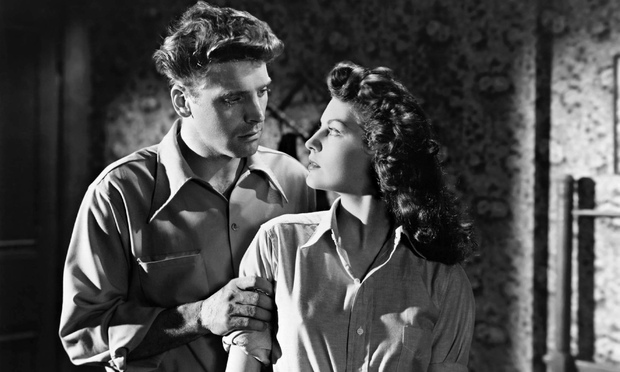My first film noir essay was on The Maltese Falcon, whose ambitious protagonist, private detective Sam Spade, chooses justice over an uncertain promise of happiness, the love of a dangerous woman. I turn now to The Killers, whose protagonist does not have such intellectual ambitions but instead the fighter’s pursuit of glory. Burt Lancaster made his film debut here as the Swede, Ole Anderson, a heavyweight boxer turned criminal, and since the film was a very big hit, it made Lancaster an instant star.
Director Robert Siodmak begins The Killers by straightforwardly filming the 1927 Hemingway short story on which the movie is based, which serves as a quarter-hour introduction. He then added an almost feature-length original story to fill out the narrative, which Hemingway is said to have appreciated when it was screened for him. This is the story of the Swede, how he was betrayed by a treacherous woman he foolishly loved, reconstituted in flashbacks by a clever insurance detective played by Edmond O’Brien, who made a career in film noir. As in The Maltese Falcon, we get a detective and a very modern idea of justice and rationality, or intellectual power, only this time the case involves insurance, another very modern idea of dealing with mortality. In The Killers, however, the shamus is not the protagonist but merely the avenger.
The Swede loves honor and tries to get it the legal way, as a boxer. You fight fair to the finish, the best man wins money and fame—he proves himself a man and that the manliest deserves great rewards. America may be all about democracy, but it’s still possible to distinguish oneself and, so to speak, compel America to love you, because equality isn’t enough for people. Democratic equality and aristocratic honor are both somehow about asserting freedom, but freedom turns out to be an ambiguous thing. The Swede breaks his fist in a fight and loses everything suddenly; it turns out that his honor-loving soul is stronger than his body, or at any rate chance trumps fate.
From that moment on, the Swede becomes a criminal, since he cannot reconcile himself to poverty or failure. He lacks the talents of a crook, but he does have daring, not to say recklessness, and he ends up in jail in a moment of noble folly. Fighting is dishonorable in America, aside from professional sports, but it’s the only thing he’s good at, and he wouldn’t do any job at which he is isn’t especially good. He could go into law enforcement, if that involved any real authority to compensate for his loss of strength. His best friend is a cop, who takes orders, makes lousy money, and is in love with a girl who’s in love with the Swede instead. Romance seems more attractive than duty.
Of course, a boxer is a source of entertainment in a gambling industry that makes a lot more money than he does. The Swede finds that the life of crime isn’t entirely different from one as a gambler—money counts, and it goes to people who are great at calculating, to whom dishonesty is as natural as honesty is to him. At this point, you could take a left-wing, even Marxist view of film noir and its criticism of injustice in America. The Swede as an exploited member of the working class suffering from false consciousness (belief in honor) instead of organizing class struggle. After all, in the movie he ends up betrayed by a criminal who becomes a capitalist entrepreneur with the loot from a robbery they commit together. The femme fatale represents luxury (surplus), and her betrayal of the Swede is merely a metaphor for oppression.
The problem with this left-wing interpretation of cinema, long dominant among the bloodless critics that make up liberalism, is lack of interest in the soul, in what makes a fighter a fighter, why a man wants to prove himself both politically and cosmically. Further, identifying love of honor with the working class rather than the military ruling class is politically unserious. It dispenses with man and politics, reducing conflict or war to technology, which provides an advantage to the rich but which can be transferred to the poor by modern science, artillery versus cavalry, let’s say. Finally, by identifying honor as the character of oppression, the worker’s false consciousness, this makes it impossible to achieve what Marxism wants, a proletariat. Workers don’t and can’t see themselves as Marx sees them, since it would require surrendering their souls in order to integrate into a rational class system for revolutionary purposes, thus sacrificing what makes them individuals worth saving in the first place.
The alternative view of art and society starts from why men admire a fighter, from the love of excellence that’s tied up with the understanding that suffering can never really be overcome: We are all mortal, yet cannot reconcile ourselves to our failures, so we continue to strive. This is the right-wing basis of storytelling, including cinema. This is why we cannot let go of stories about heroes even in a democracy, since masculine physical courage is the first virtue we need if we are to face up to our political and cosmic predicament as human beings.
Hemingway and Siodmak wanted to show with The Killers that the honest confidence of a man unafraid to be masculine simply is not enough, although it is necessary. This is of interest to everyone, because America can neither honor nor dispense with manliness. The compromise solution is a masculinity tamed by religion and marriage, but this is at the best of times a difficult proposition, given the angry pride involved in manly pursuits. In a moment of despair, betrayed by his lover, the Swede attempts suicide, which is where religion comes in. A poor, pious Irishwoman desperately prevents it, that he may not be denied eternal life—and burial. She ends up inheriting after him, his only act of gratitude in the story; after all, he doesn’t want his death, which she cannot prevent in any event, to be meaningless.
What could corrupt a proud, honest, simple man to lead him to crime for profit and then despair, attempted suicide, resignation in face of murder? A dangerous woman, of course, whose beauty deludes him precisely because it presents him with the prize he seeks in his violent struggle and, too, relief from it. This is the paradox of manliness, that it seeks something beyond itself, something worth fighting for that doesn’t share in the ugliness of fighting, and accordingly cannot justify the violence inherent in a certain kind of masculinity. Perhaps the Swede wants to stop fighting, even to surrender, or to serve something beautiful. That’s Ava Gardner, who became a star for playing Kitty Collins, a woman who thinks nothing of ruining the Swede, because if he’s foolish enough to believe in her lies, he deserves everything he gets. An ugly, calculating mind answers to his strangely innocent love of beauty.
The tension between pagan manliness and Christian faith is the movie’s big improvement on the short story. The Swede’s downfall, with which the movie begins, does have something in common with religion. He’s a man of action who becomes entirely passive, pensive, reflecting on his past mistakes, unable to change or to choose integrity, having endangered himself for love. His friends, who attend his funeral, in telling his story to the insurance detective, try to restore him to a community of faith as much as to explain his fall into crime. They love him and mourn him; they hope there is something eternal in the innocence in his soul, however betrayed in this life.
We learn this story because of the dogged insurance investigator, who gets no honor for his cleverness or for doing justice. He shares daring deeds with the Swede, but wins where the Swede had lost, apparently because he is unsentimental. Doing justice when authorities fail, going beyond the job, that’s noble; even his boss says it’s simply not profitable to waste time on the case. It means nothing if you merely calculate the profits. The investigator, however, wants to know why crime happens and how a man whose soul was noble could become a criminal. Maybe he’s also bored with his job. America, land of freedom and equality, of working stiffs and nice girls, isn’t perfect, but it’s greater than ethe sordid crimes that seem to corrupt the romantic souls who, like the Swede, long for some perfect beauty, whether glory or that vision of a woman.

